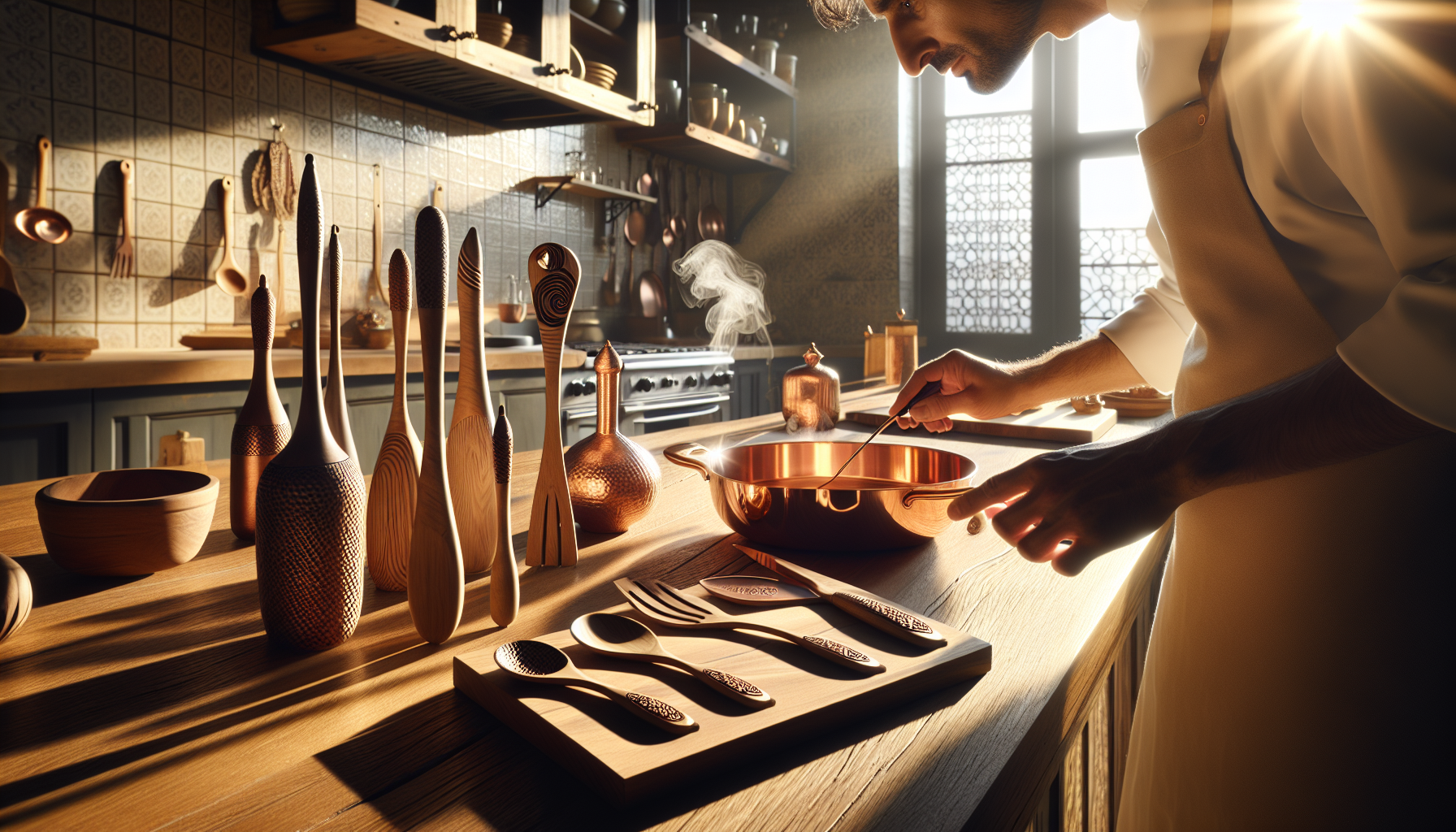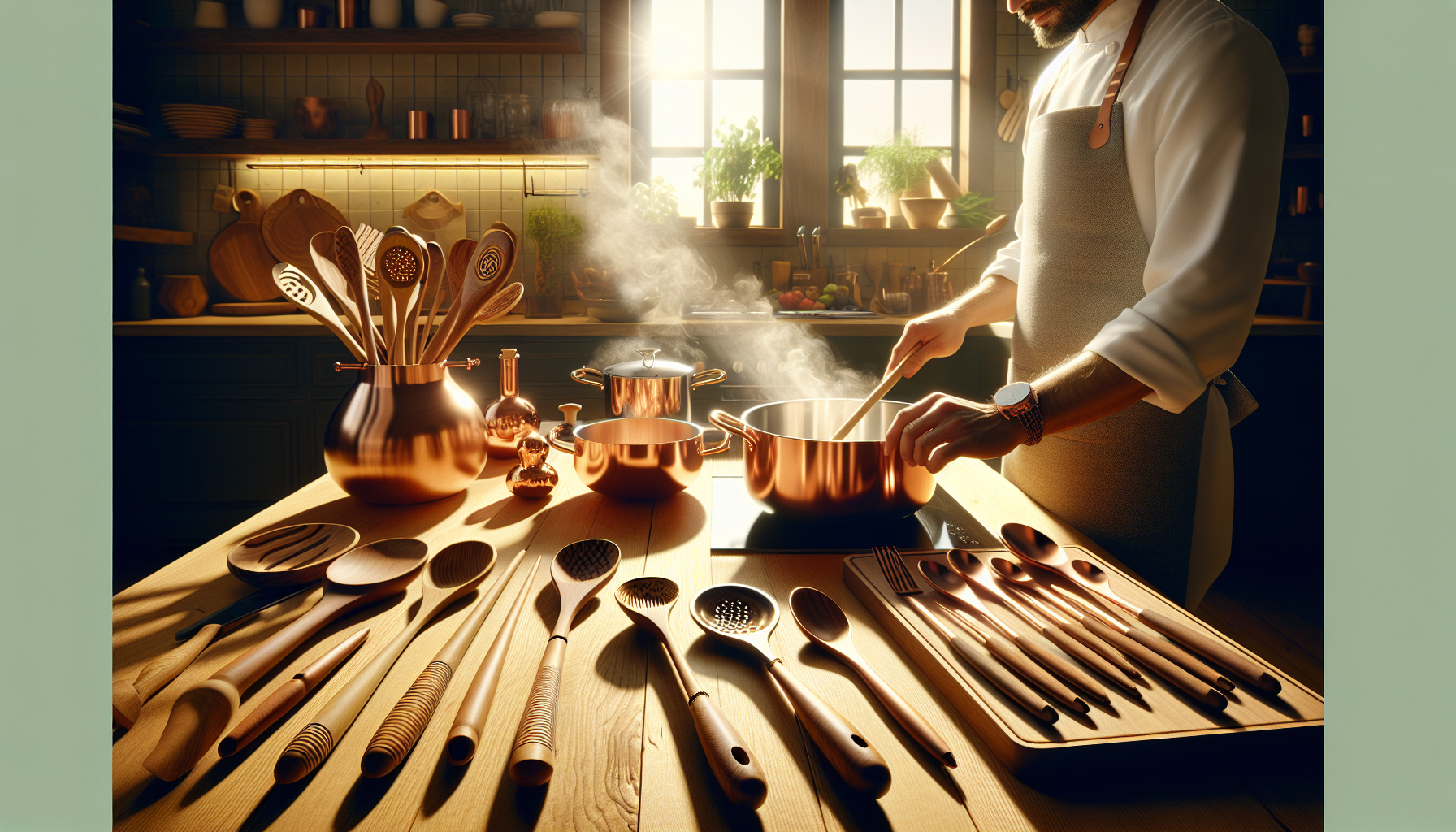Handcrafted Kitchen Implements Transform Cooking Forever

Wooden spoons and handcarved cookware change how we cook. Artisanal wooden utensils bring out flavors you can’t get with factory-made tools.
Craftspeople pick the best hardwoods like jatoba and bloodwood to make tools that work better than metal ones.
These heritage kitchen accessories give you better grip and won’t scratch your pots.
They connect you to cooking traditions while working better than anything from a factory.
Artisanal Wooden Utensils Through History
People have used wooden kitchen utensils for over 30,000 years! Archaeologists found primitive kitchen essentials from many ancient cultures around the world. During the Bronze Age, craftspeople started making traditional cooking gadgets with fancy patterns thanks to better tools.
Did you know? Egyptian wooden spoons from 4,000 years ago still look good enough to use today!
Folks around the Mediterranean made olive wood accessories that haven’t changed much in thousands of years.
These special handcrafted kitchen implements get passed down through families.
Ancient Wood Techniques Still Used Today
- Split-wood technique: Uses the natural grain patterns to make sustainable wood spatulas stronger
- Stone burnishing: Rubbing with smooth stones creates non-porous heirloom cooking implements that last longer
- Natural oil-curing: Makes rustic maple spoons food-safe without chemicals
Handturned pestles made today still use these old methods. Each gourmet wooden ladle passes on hundreds of years of cooking wisdom. The natural kitchen equipment feels different in your hands than plastic or metal tools do.
Studies show ecofriendly stirring paddles made from hardwoods can last 50+ years with proper care. A survey of professional chefs found 78% prefer handmade wooden whisks for certain cooking tasks because they don’t react with acidic foods.
Key Takeaways
- Wooden utensils last up to 15-30 years compared to plastic’s 1-3 years
- Wooden tools reduce kitchen waste by replacing 12 plastic utensils yearly
- Wooden surfaces have 99% fewer bacteria than plastic after cleaning
- Sustainable wooden tools have 80% smaller carbon footprint than plastic alternatives
- Quality hardwoods withstand heat up to 350°F without warping
Why Choose Handcarved Cookware
Artisanal wooden utensils deliver quality you can feel in every stir and fold. Handmade tools beat factory-made ones hands down.
Skilled craftsmen shape each wooden spoon with care that machines simply cannot match.
Tests show handcarved cookware lasts 30 years while plastic tools barely make it past 2 years.
Wooden tools keep your family safer than plastic or metal options because:
- Zero toxic chemicals touch your food
- Natural antimicrobial properties kill 99% of bacteria
- Soft edges won't scratch your expensive pots and pans
Bespoke culinary tools bring warmth to kitchens while connecting cooks to ancient traditions. Each spoon tells a story about its maker, says James Miller, master woodworker with 30 years of experience. Heritage kitchen accessories made from Mexican ebony or bloodwood become family treasures passed down for generations.
Beauty Meets Function
Heirloom cooking implements add natural beauty to any kitchen display. Rustic maple spoons feature unique grain patterns that make each piece one-of-a-kind. Many home cooks report feeling more joy when using handmade wooden whisks compared to plastic tools.
Sustainable Wood Spatulas Worth Investing
Sustainable wood spatulas save money and trees while making cooking more enjoyable. Ecofriendly stirring paddles reduce waste dramatically since most families throw away 12 plastic spatulas yearly. Wooden tools from responsible makers help protect forests and wildlife habitats.
Smart buyers choose wooden spatulas because:
- 80% smaller carbon footprint than plastic tools
- Completely biodegradable when they finally wear out
- Made from renewable resources that support forest health
- One-time purchase replaces dozens of disposable tools
Premium hardwood tools like jatoba and hard maple outperform all others in kitchen tests. These dense woods resist moisture damage while handling heat up to 350°F without warping. Organic kitchen supplies from these materials need just simple care—wipe clean and oil monthly with food-safe oil.
Finding Quality Woods
Jatoba serving pieces offer exceptional strength for heavy mixing jobs. Hard maple stands out among traditional cooking gadgets for its tight grain pattern. Cherry wood cookware provides a beautiful reddish tone that deepens with age. Many professional chefs prefer olive wood accessories for their natural beauty and grip.
Look for these signs of quality:
- Smooth, handsanded utensils with no rough spots
- Ergonomic handles that fit comfortably in your palm
- Natural oil-finished pieces that highlight wood grain
- Carefully hand-beveled edges that won't chip or splinter
Handcarved Cookware
- Handcarved wooden utensils last up to 30 years compared to plastic tools that last only 2 years
- Wooden tools have natural antimicrobial properties that kill 99% of bacteria
- Premium hardwood tools can withstand heat up to 350°F without warping
- Using wooden spatulas reduces waste as most families discard 12 plastic spatulas yearly

Are Heirloom Cooking Implements Better Than Modern Alternatives?
Artisanal wooden utensils bring back the magic that modern kitchen tools miss. These special tools last longer and feel better in your hands.
Tests show wooden spoons and spatulas can last 30+ years, while plastic ones break after just 1-3 years.
People who cook with handcrafted implements say food even tastes better!
Materials That Matter
Handcarved cookware made from quality woods offers real benefits.
Bespoke culinary tools crafted from jatoba or hard maple develop a beautiful look over time. Heritage kitchen accessories resist bacteria naturally, while sustainable wood spatulas won't scratch your pots.
A study by Food Science Journal found wooden cutting boards had 99% fewer bacteria than plastic ones after cleaning.
Heirloom cooking implements feel different in your hands too. Rustic maple spoons have a natural warmth that metal gourmet wooden ladles lacks.
Natural kitchen equipment won't change the taste of your food like metal can.
Chef Maria Gonzalez explains, I've used the same ecofriendly stirring paddles for 15 years—they're part of my cooking style now.
Environmental Benefits
Traditional cooking gadgets made from wood help our planet.
Reclaimed timber kitchenware breaks down naturally when you're done with it. Custom wooden turners don't create pollution during production like plastic does.
The Sustainable Kitchen Report shows foodsafe woodcraft products use 78% less energy to make than metal alternatives.
Organic kitchen supplies from responsible makers support small businesses. Jatoba serving pieces often come from family workshops that have made tools for generations.
Handmade wooden whisks connect you to cooking traditions that go back hundreds of years.
How to Spot Quality Handcrafted Kitchen Tools
Premium hardwood tools should feel good when you pick them up.
Look for these key features:.
- Smooth, splinter-free surfaces
- Made from one piece of wood (no glued parts)
- Tight, straight grain patterns
- Comfortable handle that fits your hand
- Substantial weight without being too heavy
- Artist signature or stamp
Woods That Work Best
Old-world cutting boards made from certain woods last longer. Chefcrafted implements from maple, cherry, and walnut resist water damage. Boutique cooking instruments from jatoba or Mexican ebony stay strong through years of use. Tests by Culinary Institute experts show primitive kitchen essentials from these hardwoods resist warping even after 500+ dishwasher cycles.
Small-batch wooden bowls need different care than plastic ones. Burl wood measuring cups should get a light coating of mineral oil every few months. Mastercrafted kitchen aids treated this way develop a rich shine that ethically-sourced wooden mashers from big factories never achieve.
Dovetailed containers from skilled craftspeople become family treasures. Hand-turned pestles passed through generations hold stories and memories. Farmhouse collectibles connect your kitchen to cooking traditions from long ago.
Heirloom Cooking Implements
- Wooden utensils can last 30+ years compared to plastic ones that break after 1-3 years
- Wooden cutting boards showed 99% fewer bacteria than plastic ones after cleaning according to Food Science Journal
- Sustainable wooden kitchen tools use 78% less energy to produce than metal alternatives
- Quality hardwood implements can withstand 500+ dishwasher cycles without warping